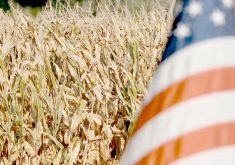A senior official with the world’s largest canola seed company says he has no idea when the crop will start moving into the European Union.
“I don’t want to speculate on that. There are too many factors,” said Joachim Schneider, head of Bayer CropScience’s bioscience business unit.
In March, European regulators approved the only remaining canola trait that hadn’t been approved, paving the way for sales of the crop into the vast EU marketplace. Four months later, no Canadian canola seed has been shipped to Europe due in part to political pressure.
Read Also

Agritechnica Day 2: The future of tractor power, building quicker crop apps and large farms and tech
Agritechnica Day 2: The future of tractor power, building quicker crop apps with Syngenta and large farms and tech
“Politicians are listening more to the voters and the public image of GM technology is pretty poor,” said Schneider.
“The non-government organizations are using Europe as a battleground for their messaging.”
European politicians are being bombarded by letters from groups like Greenpeace urging them to prevent the import of GM crops.
“They’re claiming major safety issues. They’re claiming that we do field trials without being certified or having them approved. Those are all pure, simple lies,” said Schneider.
JoAnne Buth, president of the Canola Council of Canada, said politics is only part of what’s keeping canola out.
“The biodiesel market is in the tank in Europe so we haven’t seen much demand on the seed side,” she said.
In addition, Canadian canola has to compete with cheap Ukrainian product and there are additional costs in processing GM canola from Canada because the meal has to be segregated and labelled.
“When the prices align, we think there will be movement,” said Buth.
Bayer believes Europe will eventually embrace GM crops. Biotechnology companies gained some headway in 2007 when food scarcity was a topical issue, arguing that GM crops would help address that concern.
The global food crisis has subsided but it will resurface because food will remain scarce in the long term.
“In the end, Europe will have to realize that GM technology is safe and that it is happening around the world,” said Schneider.















